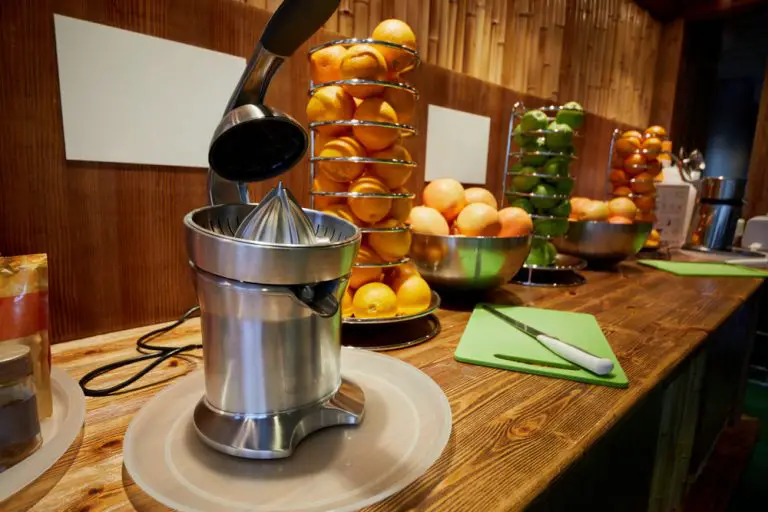How long can you freeze juice from a juicer?
Juicing fresh fruits and vegetables is a great way to get concentrated nutrients into your diet. However, juicing often yields more juice than can be consumed in one sitting. Fortunately, it is possible to freeze leftover juiced produce to enjoy later.
Can you freeze juice from a juicer?
Yes, you can freeze juice from a juicer. Freezing is an effective method for preserving the nutrients, flavor, color, and texture of freshly made juices for extended periods of time. When frozen properly in an airtight container, most juices can last for up to 6 months in the freezer before quality starts to decline.
How to freeze juice from a juicer
Follow these simple steps for freezing juice made from a juicer:
- Let the freshly made juice cool to room temperature.
- Pour the juice into freezer-safe, airtight containers, leaving about 1⁄2 inch of headspace at the top.
- Seal the containers tightly.
- Label the containers with the contents and date.
- Lay containers flat in the freezer so juice doesn’t spill when frozen.
- For best quality, use within 6 months.
Glass jars, plastic freezer containers, or ice cube trays all work well for freezing juice. Just be sure whatever container you choose is freezer-safe and has an airtight lid to prevent freezer burn.
How long does frozen juice last?
Most juices can be frozen for up to 6 months before noticeable declines in nutritional value, texture, and taste. Here are some general guidelines for how long different commonly juiced fruits and veggies last in the freezer:
| Juice Type | Freezer Life |
|---|---|
| Apple | 6 months |
| Citrus (orange, grapefruit, lemon, etc.) | 6 months |
| Carrot | 8-12 months |
| Beet | 8-12 months |
| Tomato | 6 months |
| Spinach, kale, celery | 6 months |
| Berry (strawberry, blueberry, etc.) | 6 months |
| Pineapple | 4 months |
| Watermelon | 3 months |
| Cucumber | 3 months |
Juices with higher water content tend to lose quality faster when frozen compared to more concentrated juices. Always label containers with the juice type and date before freezing so you know how long each batch has been stored.
Does freezing affect the nutrients in juice?
Freezing juice does result in some nutrient loss over time, but not as much as you may think. Studies show that the main nutrients affected by freezing are vitamin C and vitamin B. After 6 months in the freezer, juices lose around 10-15% of their vitamin C content. The loss of B vitamins is usually less than 10%.
Other nutrients like antioxidants, minerals, and dietary fiber hold up very well when juice is frozen properly. Enzymes are deactivated by freezing, but this has minimal impact on the overall nutritional value.
Compared to fresh juice, frozen juice still packs in far more essential vitamins, minerals, and phytochemicals ounce for ounce than most other beverages.
Tips for freezing juice
Follow these tips to get the most out of frozen juices:
- Use ripe, fresh produce for juicing.
- Drink juice within a day or two of juicing for maximum nutrition.
- Freeze juice in small portions you’ll use up quickly.
- Leave headspace in containers for expansion.
- Use freezer bags or containers instead of glass to avoid breakage.
- Lay flat in freezer to prevent spills.
- Label containers with contents and freeze date.
- Use within recommended time for each juice type.
- Thaw in fridge before using.
Thawing and using frozen juice
To thaw frozen juice, place the sealed container in the refrigerator 8-12 hours or overnight before using. You can also thaw smaller amounts more quickly by placing the sealed container under cold running water for about 30 minutes.
Avoid thawing at room temperature, as this increases the risk of bacterial growth in the juice.
Once thawed, give the juice a good shake or stir to recombine any separation that occurred during freezing. Taste and check for any changes in texture, color, or smell before using. Discard any juice that smells or tastes unpleasant after thawing.
Thawed juice can be enjoyed straight from the container or added to smoothies, juices, cocktails, recipes, and more. The possibilities are endless!
Can you refreeze thawed juice?
It’s best not to refreeze thawed juice. Any bacteria that was present before freezing could grow during the thawing process, making it unsafe to refreeze. Drink thawed juice within a few days and make a new batch to refreeze.
Conclusion
Freezing juice from your juicer is a simple way to reduce waste and always have access to fresh, nutritious juice. With proper freezing and thawing methods, juice can retain most of its flavor, color, texture, and nutritional value for up to 6 months. Label your frozen juice containers, follow recommended freezer times for each type, and enjoy the convenience of having juice ready anytime you need a nutritious boost!


